
The Korean War: Another Illuminati Fraud
Jame Perloff
For the Illuminati, war is revolutionary because it advances world government.
Peace is "counter revolutionary."
In this brilliant synopsis, James Perloff shows how the Korean War,
indeed North Korea itself, were unnecessary and
completely contrived. An estimated 1.2 million people died on both sides.
A good day's work for Illuminati Satanists.
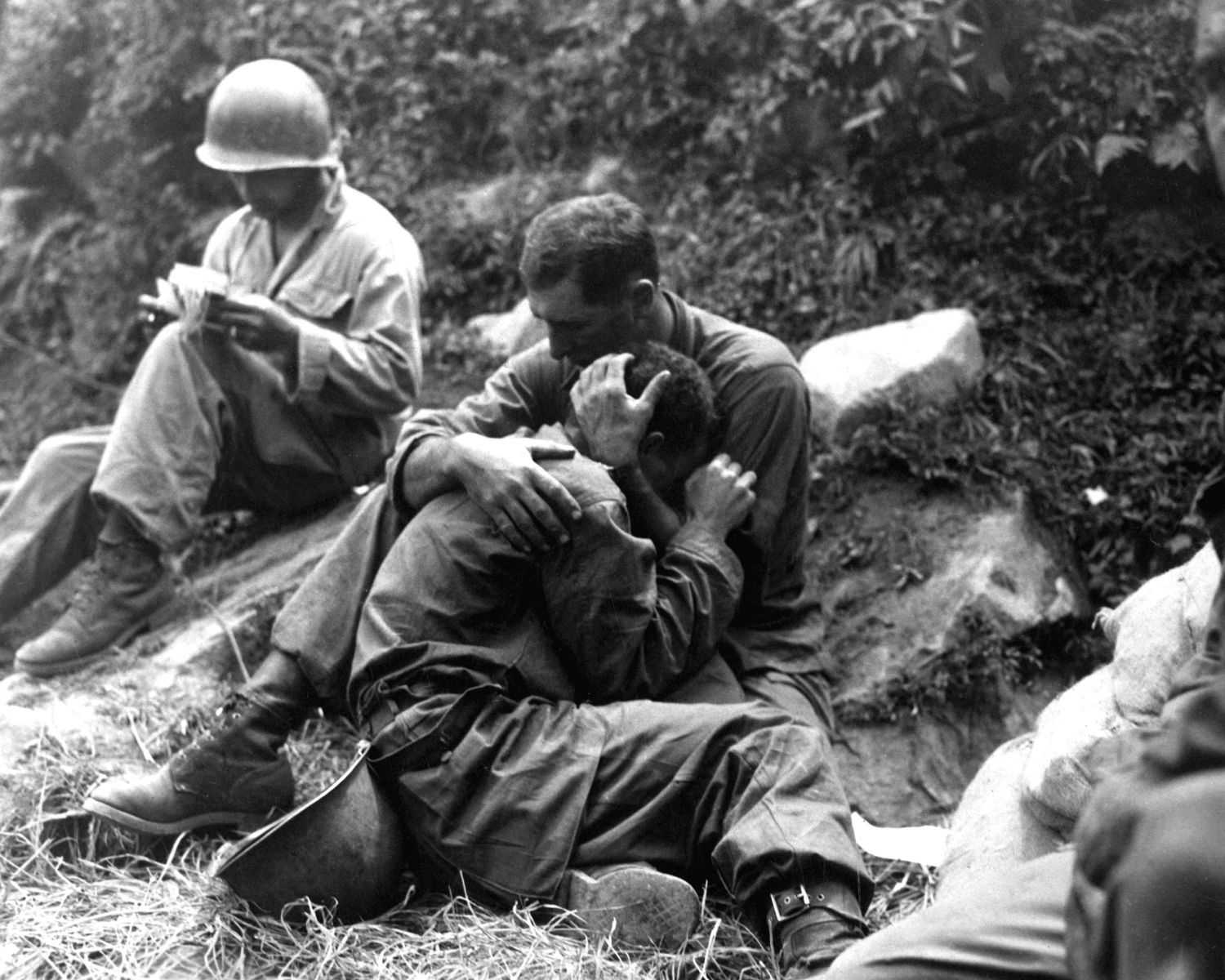
"I had actually been denied the use of my full military power to safeguard the lives of my soldiers and the safety of my army. To me, it clearly foreshadowed a future tragic situation in Korea, and left me with a sense of inexpressible shock." General Douglas MacArthur
by James Perloff
(henrymakow.com)
In June 1950, Kim Il-sung,North Korea's communist dictator, invaded South Korea. American forces, under UN authority, came to South Korea's defense resulting in a three-year war that ended in stalemate. The artificially contrived war served at least two major Illuminati purposes - empower world government, and disenfranchise the U.S. Congress from authority to declare war.
• If President Franklin D. Roosevelt had not asked Joseph Stalin to enter the Pacific war during World War II, there never would have been a communist regime in North Korea.
• As a condition for entering the Pacific War, Stalin demanded - and received - some 600 shiploads of lend-lease equipment and munitions for his Far Eastern army.
• Stalin waited until the United States had beaten Japan to join the Pacific War. His troops entered China just 5 days before the war ended. The atomic bomb had already pounded Hiroshima.
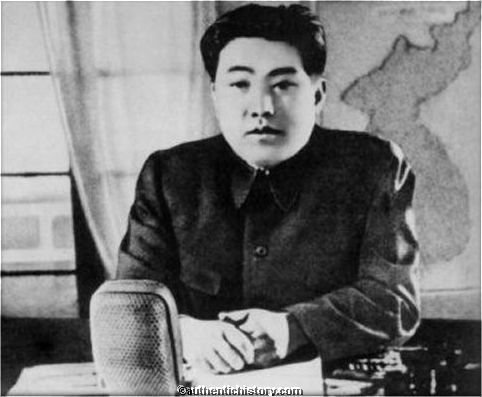 (left. Kim Il Sung)
(left. Kim Il Sung)
• Korea had been a Japanese protectorate. In 1944, Foreign Affairs - the journal of the Council on Foreign Relations (CFR) - published an article suggesting Korea become a trusteeship ruled by the Allies including Russia. The Soviets occupied North Korea, while the U.S. occupied the south. No one asked for the Koreans' opinion.
• Stalin established a communist regime under Kim Il-sung in North Korea, building a 150,000-man army with hundreds of tanks and hundreds of warplanes. When the United States departed South Korea, it left only a constabulary force of South Koreans with small arms. They did not have a single tank or even one anti-tank gun.
• This arms imbalance made invasion of South Korea a certainty. In 1949, Mao Tse-tung consolidated communist control of China, securing Kim's rear. In January 1950, Kim proclaimed this would be Korea's "year of unification," calling for "complete preparedness for war."
• Sweetening the pot for Kim, America's ever-intriguing Secretary of State Dean Acheson (CFR, Scroll & Key, Committee of 300) gave a speech placing South Korea beyond America's "defensive perimeter." Victims outside the perimeter, he said, would have to rely "upon the commitments of the entire civilized world under the Charter of the United Nations" - intimating the role Korea would play in the Illuminati agenda.
• The Illuminati seek world domination. To govern the world requires a world government. Protocol 5:11 said they intended "gradually to absorb all the state forces of the world and to form a super-government."
• World War I produced the first attempted world government - the League of Nations. The CFR was founded in 1921 in direct response to America's refusal to join the League. Council members drew up the plans for the League's successor, the United Nations. At the UN's 1945 founding conference in San Francisco, 47 of the American delegates were CFR members. David Rockefeller was long CFR chairman; his brother, John D., Jr., donated $8.5 million to purchase the land where the UN was built.
• Once the UN was established, the next step was to try to empower it by validating its peacekeeping credentials. (The UN Charter's first purpose is "To maintain international peace and security.") Hence the Korean War came into play.
• Nearly two years into the Korean War, the lead article for the April 1952 Foreign Affairs was entitled"Korea in Perspective." It summed up: "We have made historic progress toward the establishment of a viable system of collective security."
CONGRESSIONAL AUTHORITY
The Korean War fulfilled another Illuminati objective: usurping Congress's authority to declare war.
• The Protocols, 10th section, predicted: "In the near future we shall establish the responsibility of presidents. . . . We shall invest the president with the right of declaring a state of war." (A president is easier to control than a legislature.)
• Congress's authority to declare war has not been invoked since it ratified the UN Charter. President Truman sent troops to Korea without even consulting Congress. He explained: "We are not at war; this is a police action." The United States suffered over 100,000 casualties in Korea - but not to worry, this was just "a police action."
• Congress did not protest Truman's action very vigorously because the Illuminati were playing a trump card. The UN's strongest opponents in Congress were also anti-communists. They had condemned the Truman State Department for manipulating China's fall to communism. With Korea, Truman appeared to be atoning for that by sending troops to halt communist aggression. If Congress tried asserting its prerogatives, Korea could meanwhile fall to Kim Il-sung's advancing forces.
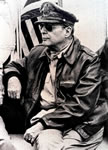 • But the backstage Illuminists had no intention of "fighting communism." General Douglas MacArthur, left, commander of UN forces, learned this the hard way. MacArthur not only repelled the invasion, but - following his soldier's instincts - pursued victory, liberating North Korea from communism nearly to the Yalu River, which marks China's border. At this point, Red China poured its troops into the conflict. MacArthur ordered the Yalu's bridges bombed to keep them out, but within hours his order was countermanded by Washington - which would cost thousands of GIs their lives.
• But the backstage Illuminists had no intention of "fighting communism." General Douglas MacArthur, left, commander of UN forces, learned this the hard way. MacArthur not only repelled the invasion, but - following his soldier's instincts - pursued victory, liberating North Korea from communism nearly to the Yalu River, which marks China's border. At this point, Red China poured its troops into the conflict. MacArthur ordered the Yalu's bridges bombed to keep them out, but within hours his order was countermanded by Washington - which would cost thousands of GIs their lives.
General MacArthur said of this: "I realized for the first time that I had actually been denied the use of my full military power to safeguard the lives of my soldiers and the safety of my army. To me, it clearly foreshadowed a future tragic situation in Korea, and left me with a sense of inexpressible shock."
This with the new concept of "limited war." Victory had become an anachronism, replaced by "containment," the idea originated in the famous 1947 "Mr. X" article in Foreign Affairs. MacArthur was soon dismissed from command in Korea - like Patton, expendable after serving his purposes.
Perhaps the greatest irony: the Soviet Union could have prevented the UN action in Korea simply by vetoing it as a member of the Security Council. After all, Kim Il-sung was their puppet. However, on the day of the Korea vote, the Soviet delegation was absent. They were in the middle of a walkout staged over the UN's failure to seat Red China. Secretary General Trygve Lie invited Jacob Malik, Soviet Ambassador to the UN, to attend the Korea vote, but he declined. Establishment historians call this a "Soviet blunder." But had Malik (died 1980) really goofed, Stalin would have had him nailed to a board.
The Korean War was not about victory on either side, but about validating the UN as "peacekeeper." Including civilians, some three million died on this altar to world government. When the war ended, Korea's North-South borders were restored to approximately where they had been at the outset. General Mark Clark commented: "In carrying out the instructions of my government, I gained the unenviable distinction of being the first United States Army commander in history to sign an armistice without victory."
--
For elaboration of the above, see the author's full article.
James Perloff is author of several books; his latest is Truth Is a Lonely Warrior. His website is jamesperloff.com.
Related -- Korean Conflict Festers Today - See more at: http://henrymakow.com/2014/04/The-Korean-War.html#sthash.f1o8QMZs.dpuf
http://henrymakow.com/2014/04/The-Korean-War.html
Peace is "counter revolutionary."
In this brilliant synopsis, James Perloff shows how the Korean War,
indeed North Korea itself, were unnecessary and
completely contrived. An estimated 1.2 million people died on both sides.
A good day's work for Illuminati Satanists.
"I had actually been denied the use of my full military power to safeguard the lives of my soldiers and the safety of my army. To me, it clearly foreshadowed a future tragic situation in Korea, and left me with a sense of inexpressible shock." General Douglas MacArthur
by James Perloff
(henrymakow.com)
In June 1950, Kim Il-sung, North Korea's communist dictator, invaded South Korea. American forces, under UN authority, came to South Korea's defense resulting in a three-year war that ended in stalemate. The artificially contrived war served at least two major Illuminati purposes - empower world government, and disenfranchise the U.S. Congress from authority to declare war.
• If President Franklin D. Roosevelt had not asked Joseph Stalin to enter the Pacific war during World War II, there never would have been a communist regime in North Korea.
• As a condition for entering the Pacific War, Stalin demanded - and received - some 600 shiploads of lend-lease equipment and munitions for his Far Eastern army.
• Stalin waited until the United States had beaten Japan to join the Pacific War. His troops entered China just 5 days before the war ended. The atomic bomb had already pounded Hiroshima.
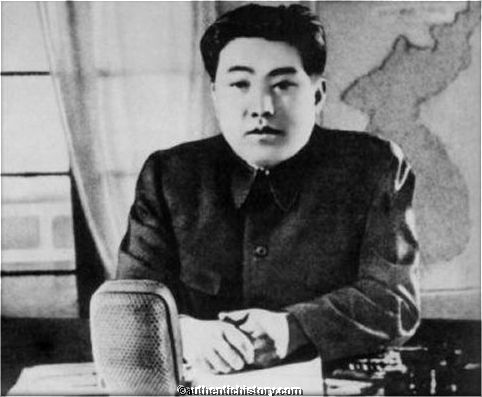 (left. Kim Il Sung)
(left. Kim Il Sung)
• Korea had been a Japanese protectorate. In 1944, Foreign Affairs - the journal of the Council on Foreign Relations (CFR) - published an article suggesting Korea become a trusteeship ruled by the Allies including Russia. The Soviets occupied North Korea, while the U.S. occupied the south. No one asked for the Koreans' opinion.
• Stalin established a communist regime under Kim Il-sung in North Korea, building a 150,000-man army with hundreds of tanks and hundreds of warplanes. When the United States departed South Korea, it left only a constabulary force of South Koreans with small arms. They did not have a single tank or even one anti-tank gun.
• This arms imbalance made invasion of South Korea a certainty. In 1949, Mao Tse-tung consolidated communist control of China, securing Kim's rear. In January 1950, Kim proclaimed this would be Korea's "year of unification," calling for "complete preparedness for war."
• Sweetening the pot for Kim, America's ever-intriguing Secretary of State Dean Acheson (CFR, Scroll & Key, Committee of 300) gave a speech placing South Korea beyond America's "defensive perimeter." Victims outside the perimeter, he said, would have to rely "upon the commitments of the entire civilized world under the Charter of the United Nations" - intimating the role Korea would play in the Illuminati agenda.
• The Illuminati seek world domination. To govern the world requires a world government. Protocol 5:11 said they intended "gradually to absorb all the state forces of the world and to form a super-government."
• World War I produced the first attempted world government - the League of Nations. The CFR was founded in 1921 in direct response to America's refusal to join the League. Council members drew up the plans for the League's successor, the United Nations. At the UN's 1945 founding conference in San Francisco, 47 of the American delegates were CFR members. David Rockefeller was long CFR chairman; his brother, John D., Jr., donated $8.5 million to purchase the land where the UN was built.
• Once the UN was established, the next step was to try to empower it by validating its peacekeeping credentials. (The UN Charter's first purpose is "To maintain international peace and security.") Hence the Korean War came into play.
• Nearly two years into the Korean War, the lead article for the April 1952 Foreign Affairs was entitled "Korea in Perspective." It summed up: "We have made historic progress toward the establishment of a viable system of collective security."
CONGRESSIONAL AUTHORITY
The Korean War fulfilled another Illuminati objective: usurping Congress's authority to declare war.
• The Protocols, 10th section, predicted: "In the near future we shall establish the responsibility of presidents. . . . We shall invest the president with the right of declaring a state of war." (A president is easier to control than a legislature.)
• Congress's authority to declare war has not been invoked since it ratified the UN Charter. President Truman sent troops to Korea without even consulting Congress. He explained: "We are not at war; this is a police action." The United States suffered over 100,000 casualties in Korea - but not to worry, this was just "a police action."
• Congress did not protest Truman's action very vigorously because the Illuminati were playing a trump card. The UN's strongest opponents in Congress were also anti-communists. They had condemned the Truman State Department for manipulating China's fall to communism. With Korea, Truman appeared to be atoning for that by sending troops to halt communist aggression. If Congress tried asserting its prerogatives, Korea could meanwhile fall to Kim Il-sung's advancing forces.
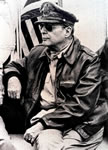 • But the backstage Illuminists had no intention of "fighting communism." General Douglas MacArthur, left, commander of UN forces, learned this the hard way. MacArthur not only repelled the invasion, but - following his soldier's instincts - pursued victory, liberating North Korea from communism nearly to the Yalu River, which marks China's border. At this point, Red China poured its troops into the conflict. MacArthur ordered the Yalu's bridges bombed to keep them out, but within hours his order was countermanded by Washington - which would cost thousands of GIs their lives.
• But the backstage Illuminists had no intention of "fighting communism." General Douglas MacArthur, left, commander of UN forces, learned this the hard way. MacArthur not only repelled the invasion, but - following his soldier's instincts - pursued victory, liberating North Korea from communism nearly to the Yalu River, which marks China's border. At this point, Red China poured its troops into the conflict. MacArthur ordered the Yalu's bridges bombed to keep them out, but within hours his order was countermanded by Washington - which would cost thousands of GIs their lives.
General MacArthur said of this: "I realized for the first time that I had actually been denied the use of my full military power to safeguard the lives of my soldiers and the safety of my army. To me, it clearly foreshadowed a future tragic situation in Korea, and left me with a sense of inexpressible shock."
This with the new concept of "limited war." Victory had become an anachronism, replaced by "containment," the idea originated in the famous 1947 "Mr. X" article in Foreign Affairs. MacArthur was soon dismissed from command in Korea - like Patton, expendable after serving his purposes.
Perhaps the greatest irony: the Soviet Union could have prevented the UN action in Korea simply by vetoing it as a member of the Security Council. After all, Kim Il-sung was their puppet. However, on the day of the Korea vote, the Soviet delegation was absent. They were in the middle of a walkout staged over the UN's failure to seat Red China. Secretary General Trygve Lie invited Jacob Malik, Soviet Ambassador to the UN, to attend the Korea vote, but he declined. Establishment historians call this a "Soviet blunder." But had Malik (died 1980) really goofed, Stalin would have had him nailed to a board.
The Korean War was not about victory on either side, but about validating the UN as "peacekeeper." Including civilians, some three million died on this altar to world government. When the war ended, Korea's North-South borders were restored to approximately where they had been at the outset. General Mark Clark commented: "In carrying out the instructions of my government, I gained the unenviable distinction of being the first United States Army commander in history to sign an armistice without victory."
--
For elaboration of the above, see the author's full article.
James Perloff is author of several books; his latest is Truth Is a Lonely Warrior. His website is jamesperloff.com.
Related -- Korean Conflict Festers Today - See more at: http://henrymakow.com/2014/04/The-Korean-War.html#sthash.f1o8QMZs.dpuf
